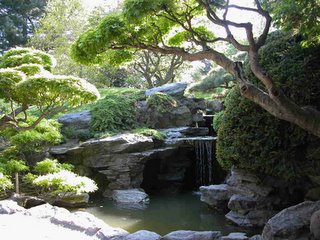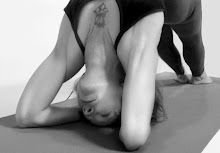Some things simply cannot be said any better...
November 12, 2005
Op-Ed Contributor
Our Faith in Science
By TENZIN GYATSO
Washington
SCIENCE has always fascinated me. As a child in Tibet, I was keenly curious about how things worked. When I got a toy I would play with it a bit, then take it apart to see how it was put together. As I became older, I applied the same scrutiny to a movie projector and an antique automobile.
At one point I became particularly intrigued by an old telescope, with which I would study the heavens. One night while looking at the moon I realized that there were shadows on its surface. I corralled my two main tutors to show them, because this was contrary to the ancient version of cosmology I had been taught, which held that the moon was a heavenly body that emitted its own light.
But through my telescope the moon was clearly just a barren rock, pocked with craters. If the author of that fourth-century treatise were writing today, I'm sure he would write the chapter on cosmology differently.
If science proves some belief of Buddhism wrong, then Buddhism will have to change. In my view, science and Buddhism share a search for the truth and for understanding reality. By learning from science about aspects of reality where its understanding may be more advanced, I believe that Buddhism enriches its own worldview.
For many years now, on my own and through the Mind and Life Institute, which I helped found, I have had the opportunity to meet with scientists to discuss their work. World-class scientists have generously coached me in subatomic physics, cosmology, psychology, biology.
It is our discussions of neuroscience, however, that have proved particularly important. From these exchanges a vigorous research initiative has emerged, a collaboration between monks and neuroscientists, to explore how meditation might alter brain function.
The goal here is not to prove Buddhism right or wrong - or even to bring people to Buddhism - but rather to take these methods out of the traditional context, study their potential benefits, and share the findings with anyone who might find them helpful.
After all, if practices from my own tradition can be brought together with scientific methods, then we may be able to take another small step toward alleviating human suffering.
Already this collaboration has borne fruit. Dr. Richard Davidson, a neuroscientist at the University of Wisconsin, has published results from brain imaging studies of lamas meditating. He found that during meditation the regions of the brain thought to be related to happiness increase in activity. He also found that the longer a person has been a meditator, the greater the activity increase will be.
Other studies are under way. At Princeton University, Dr. Jonathan Cohen, a neuroscientist, is studying the effects of meditation on attention. At the University of California Medical School at San Francisco, Dr. Margaret Kemeny has been studying how meditation helps develop empathy in school teachers.
Whatever the results of this work, I am encouraged that it is taking place. You see, many people still consider science and religion to be in opposition. While I agree that certain religious concepts conflict with scientific facts and principles, I also feel that people from both worlds can have an intelligent discussion, one that has the power ultimately to generate a deeper understanding of challenges we face together in our interconnected world.
One of my first teachers of science was the German physicist Carl von Weizsäcker, who had been an apprentice to the quantum theorist Werner Heisenberg. Dr. Weizsäcker was kind enough to give me some formal tutorials on scientific topics. (I confess that while listening to him I would feel I could grasp the intricacies of the full argument, but when the sessions were over there was often not a great deal of his explanation left behind.)
What impressed me most deeply was how Dr. Weizsäcker worried about both the philosophical implications of quantum physics and the ethical consequences of science generally. He felt that science could benefit from exploring issues usually left to the humanities.
I believe that we must find a way to bring ethical considerations to bear upon the direction of scientific development, especially in the life sciences. By invoking fundamental ethical principles, I am not advocating a fusion of religious ethics and scientific inquiry.
Rather, I am speaking of what I call "secular ethics," which embrace the principles we share as human beings: compassion, tolerance, consideration of others, the responsible use of knowledge and power. These principles transcend the barriers between religious believers and non-believers; they belong not to one faith, but to all faiths.
Today, our knowledge of the human brain and body at the cellular and genetic level has reached a new level of sophistication. Advances in genetic manipulation, for example, mean scientists can create new genetic entities - like hybrid animal and plant species - whose long-term consequences are unknown.
Sometimes when scientists concentrate on their own narrow fields, their keen focus obscures the larger effect their work might have. In my conversations with scientists I try to remind them of the larger goal behind what they do in their daily work.
This is more important than ever. It is all too evident that our moral thinking simply has not been able to keep pace with the speed of scientific advancement. Yet the ramifications of this progress are such that it is no longer adequate to say that the choice of what to do with this knowledge should be left in the hands of individuals.
This is a point I intend to make when I speak at the annual meeting of the Society for Neuroscience today in Washington. I will suggest that how science relates to wider humanity is no longer of academic interest alone. This question must assume a sense of urgency for all those who are concerned about the fate of human existence.
A deeper dialogue between neuroscience and society - indeed between all scientific fields and society - could help deepen our understanding of what it means to be human and our responsibilities for the natural world we share with other sentient beings.
Just as the world of business has been paying renewed attention to ethics, the world of science would benefit from more deeply considering the implications of its own work. Scientists should be more than merely technically adept; they should be mindful of their own motivation and the larger goal of what they do: the betterment of humanity.
Tenzin Gyatso, the 14th Dalai Lama, is the author of "The Universe in a Single Atom: The Convergence of Science and Spirituality."
Copyright 2005 The New York Times Company





